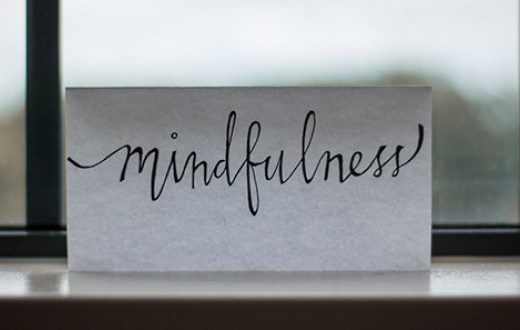A Dip Into The Truth
Our own experience tells us time and time again that expectations reduce our enjoyment of life. Yet, most of us do not even realize that a lot of times having too many expectations about everything could be a reason for not naturally feeling happy.
For example, we go to see a movie that everyone has been raving about and even at the theater we experience the hype and the buzz. Then, when we see the movie - yes, it was good, but not that wonderful! Sounds familiar?

On the other hand, friends throw a surprise party for you and you have a fabulous time. There is a lot of joy in surprises, which is why kids love them. Expectations, which are just our imaginings about how things might be, prevent the mind from being fully with what is happening in the moment and so reduce the joy that is inherent in the present moment.
Clearly, expectations are not something we can or should avoid. They are just like all other thoughts—they arise and pass away on their own. Simply observing them with the knowledge that they reduce enjoyment in life is enough for some of us to avoid getting caught up most of the time. But for other people, unfulfilled expectations are a major source of disturbance. Many of us need an understanding of our mind and of life itself before we can let go of expectations. This understanding can be gained through wisdom and meditation.
Example:
Let’s take an example of an expectation and how meditation and practical wisdom can help to reduce the disturbance around it.
Say you’re attending a group meditation session. You have an expectation that people doing the meditation will comply with the instruction given prior to the session to turn off their mobile phones.
You are starting to sink into a pleasant meditative state when a phone rings loudly. Phones continue to ring several more times during the session. One possible response is that you let go of your expectation that people obey the instruction to turn their phones off and accept the ringing phones as you would any other noise.
Alternatively, you may be unable to do that and may feel that the phone owners are lacking in awareness, selfish, and inconsiderate. Consequently, your mind will be simmering with irritation during your “meditation”. You may spend much of the session mentally criticizing these people or the organizers, or you may be planning what you will say to the organizers later.
What are the key realizations that can pull you out of this reaction?
The recognition that the problem is not in the situation but in your reaction to it! Equally loud or louder noises could be made by dogs barking, rain, thunder, or traffic. Crickets chirping could make a sound quite similar to a mobile phone ringing. Yet, if they were to make noises during a meditation session, you are unlikely to feel that the rain, dogs, or crickets are selfish or unaware. You would probably not accuse truck drivers driving past and honking their horns of being inconsiderate.
The reason you would not be annoyed about the noise generated by these phenomena is that you would accept them as “part of nature” and as spontaneous happenings. On the other hand, with the phones, you feel that the situation could have been avoided if people would have behaved as they should. The feeling that the situation could have been different is at the core of your disturbance.
It is important to understand that the ringing of phones is also a happening and is as much a “natural” phenomenon as rain or barking dogs. (this is not to say that you wouldn’t talk to the organizers and see if they could do something more to stop it occurring in the future).
See also that at the time, there is nothing you can do about the expectation not being met. It is completely out of your control.
How Does Meditation Help?
Mediation helps with uprooting the disturbance or disappointment caused by unfulfilled expectations? When you meditate without any attempt to control your mind, you will, sooner or later, arrive at the firm conviction that thoughts, feelings, and body sensations are arising and disappearing all by themselves, without any volition on your part. Your response to those phenomena is also not directly in your control.
For example, in meditation, on some days the mind will drift in a daydream for many minutes without you being aware, whereas on other days you are aware very quickly that you are daydreaming. Sometimes you may be annoyed by your thoughts but on other days you spontaneously accept them or are even amused by them.
Meditation also helps us to let go of expectations by allowing the mind to rest more and more in the present moment. By opening the mind to being more aware through regular meditation, we become more and more fulfilled and calm in the moment. The mind gains the ability to spontaneously accept people and situations as they are. Consequently, regular meditation will, over time, result in fewer expectations and less disturbance and disappointment over unfulfilled expectations.
An Interesting Exercise:
Look for a convenient time and place to meditate. Turn on a guided meditation track. Once you have meditated and your mind is calmer, do the following activity.
Make a list of unfulfilled expectations that have disturbed you recently; for example, your partner is untidy and doesn’t do as much work around the house as you think they should, your friend forgot your birthday, or you didn’t get the job you thought was a sure thing.
Examine these expectations and see that in every case you have no direct control over whether they are fulfilled or not. See that each of them is a happening. See that the people involved are creatures of their habits, beliefs, life experiences, and genetics—none of which are under their control. See that people’s behavior is as much a natural phenomenon as the weather. Also note that everything in life is changing, including people and situations and your perception of them. For example, your partner‘s behavior may change and your perception of it may also change.
Be aware that the more your mind is fixated on “me” and “my problems”, the more expectations you will have and the more upset you’ll be if they’re not met.
Keep meditating and relax!
Written by Chris Dale, Advance Meditation Course Teacher
































